This weekend we’re not watching
A steaming pile of disappointment: Michael Bay’s new action film, ‘Ambulance’
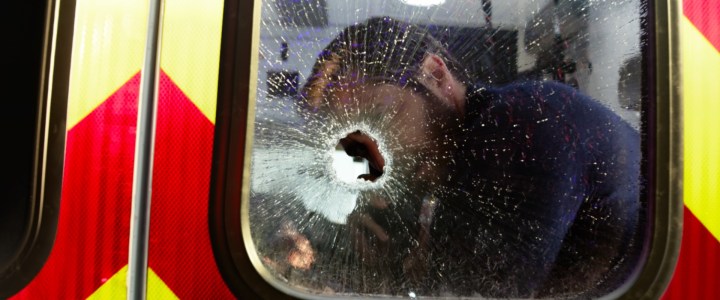
Michael Bay’s movie-making has bolstered the action blockbuster as the bully of the film world. His new film, ‘Ambulance’, is an example of how a heavily marketing-based production tricks so many people into watching his formulaic films.
Michael Bay is an American director and producer of big-budget action films such as the Bad Boys and Transformers franchises. His films typically feature attractive male protagonists; sexy, largely insignificant female companions; expensive cars; explosions and extensive CGI. Those drawcards are apparently enough to have made him the fourth-most commercially successful director in history (or fifth if you count the Russo brothers separately).
Bay’s new film, Ambulance, is about a handsome good-guy war veteran and new father (Yahya Abdul-Mateen II) who in an attempt to pay for his ailing wife’s surgery joins his adoptive brother Danny (Jake Gyllenhaal), a psychopathic bank robber, on a $32-million bank heist. Unsurprisingly, the heist descends into mayhem and in order to escape the brothers hijack an ambulance with an injured cop as a hostage and commence a frantic car chase through Los Angeles.
The best way to take in a Michael Bay film is to only watch the trailer. The trailer for Ambulance is a perfect example: it condenses the best stunts, jokes and ideas of the film, as well as the entire plot, into a well-edited two-and-a-half minutes. The two-and-a-half-hour film itself, however, is a steaming pile of disappointment, and it takes them 50 minutes to get to the part where they commandeer the ambulance, which is the entire premise of the film.
This is because Bay’s business model prioritises marketing over everything else; his huge budgets allow him to splurge on explosions and other grand CGI stunts that make for excellent trailer-fodder. Additional hype is created on the back of the commercial success of his previous film/s (despite their negative reviews) and once these strategies have convinced viewers to dole out cash for movie tickets, Bay’s job is done, and the film itself is just an exercise in going through the motions of a formulaic action blockbuster. Bay sums up his attitude towards consumers of his films thus: “They love to hate, and I don’t care. Let them hate – they’re still going to see the movie!”
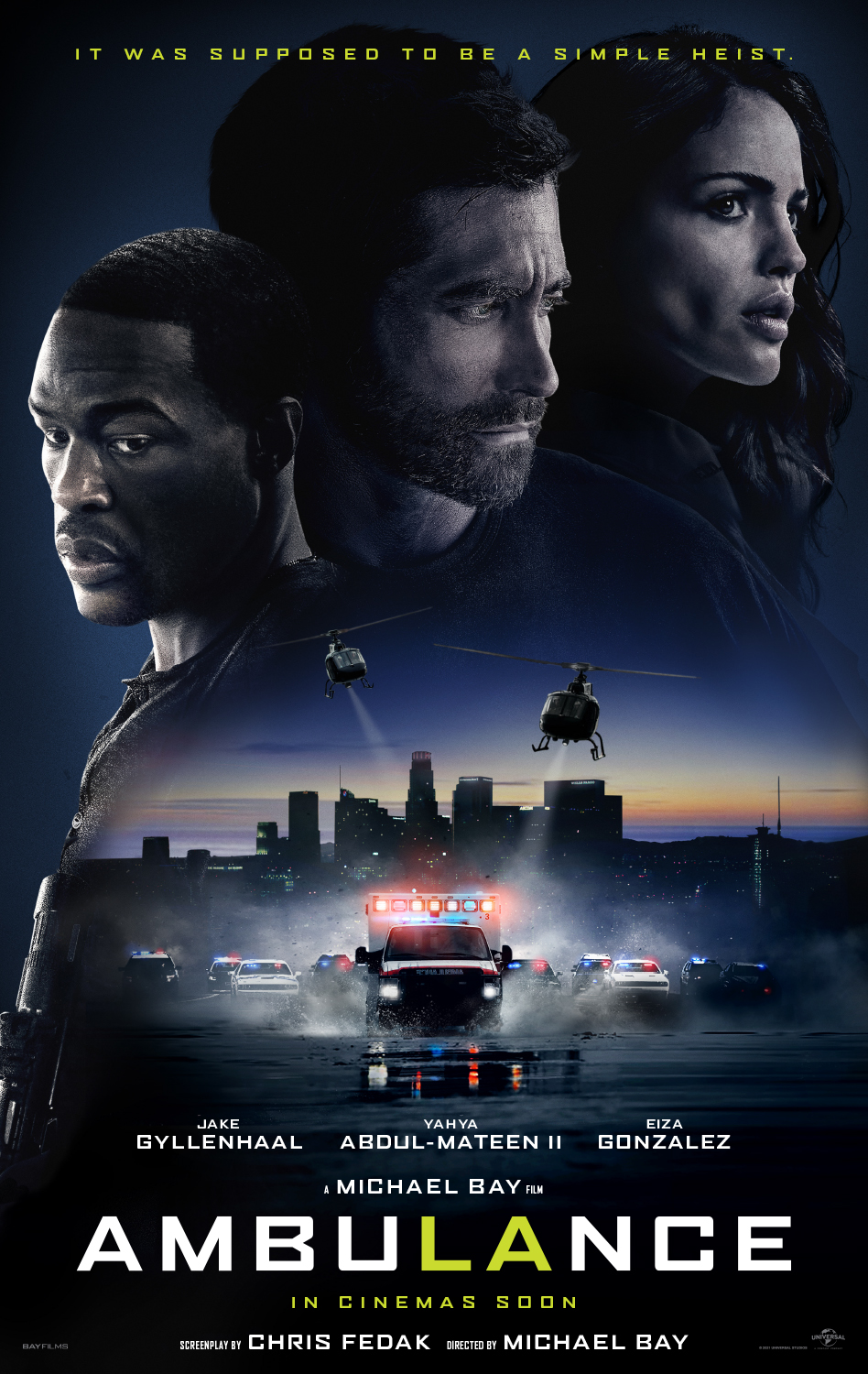
Ambulance official poster. Image: courtesy of Universal Pictures.
Bay’s films are high concept, which is a gentle way of saying they are experiential films lacking substance, based on simple premises that can be pitched succinctly. A lot of summer blockbusters are high concept – a perfect example is Snakes on a Plane, which describes its entire premise in the title alone.
The most awful feature of high-concept films is that they tend to be devoid of character development. They’re like formulaic jokes – empty generic set-ups that are mediums to deploy a punchline. In Bay’s case, instead of “a man walks into a bar”, it would be something like, “an attractive male badass with an automatic weapon drives away from some baddies”. It’s not important who he is, just fill in the blanks and enjoy the explosions.
Hence, in Ambulance, Bay shows short, overexposed slow-motion flashbacks of Will and Danny’s childhoods, a paint-by-numbers recipe for synthetic nostalgia, but never explores why Will was adopted. His being adopted adds nothing to the film either, and it seems clear that the reason for it was so that Bay could snatch up whoever were the biggest male leads willing to work with him and have their characters tied by blood even if they didn’t look like brothers.
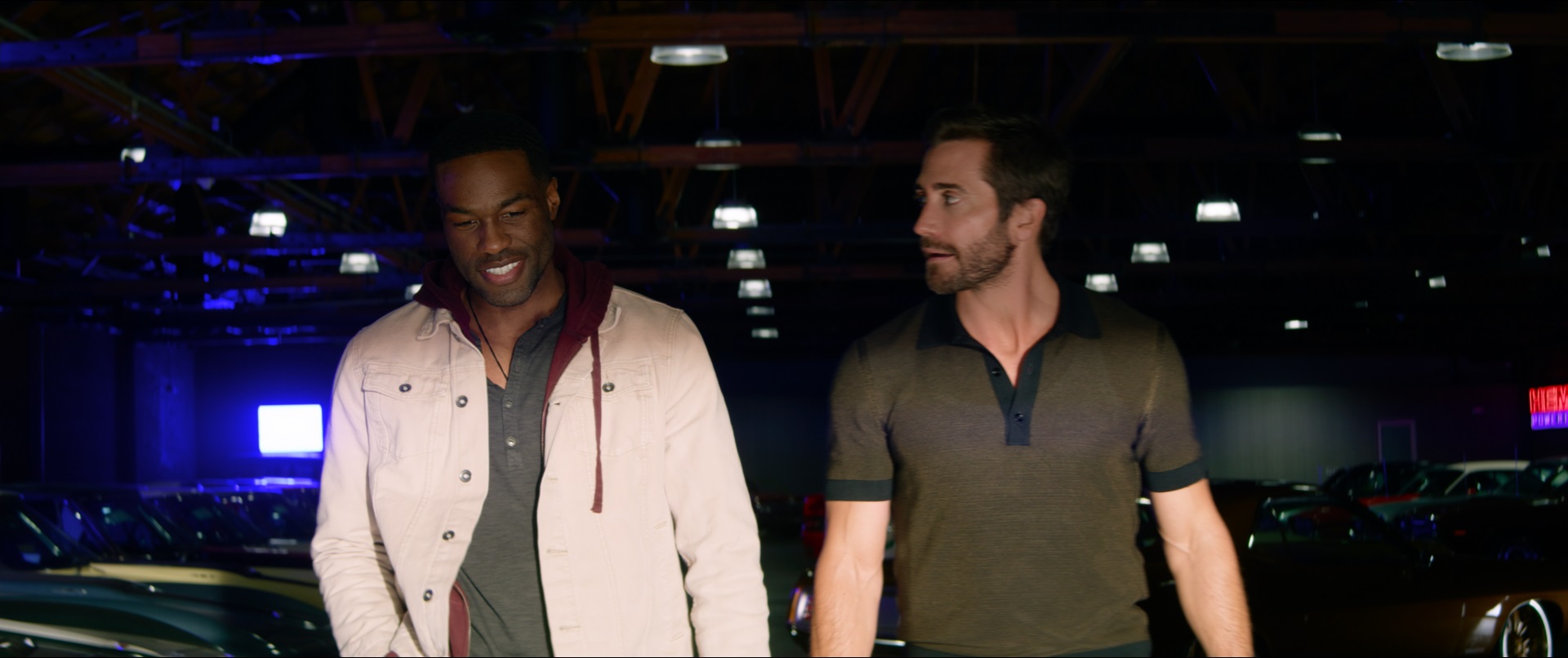
Yahya Abdul-Mateen II as William Sharp and Jake Gyllenhaal as Danny Sharp. Image: courtesy of Universal Pictures.
All of the scarce character backstories in the film serve similarly lazy functions. The fact that Will is a war veteran is a double-whammy lazy tactic, which both ingratiates him to an American audience and explains his being absurdly capable at anything from combat to surgery to extreme driving.
Will’s wife needs expensive surgery (a common plot device used to justify a protagonist’s illegal activities in the eyes of an audience) but we never even find out what kind of surgery she needs. All you need to know is that she’s desperate and Will’s crimes are for a good cause.
This manipulation of subjective ethics is an essential quality of Bay’s films. There has to be a degree of selective blindness about violence and a double standard of morality that allows the good guys to do bad things. A cop shoots a criminal and his colleague congratulates him with a pat on the back.
Part of the premise of the hour-and-a-half car chase in the ambulance is that the police won’t kill Will and Danny because they don’t want to risk injuring the cop hostage, and Will and Danny still believe they can get out of the situation because they haven’t killed the cop. Yet dozens of police vehicles are thrown around like bowling pins during the chase, presumably injuring and possibly killing some of them, and neither the thief brothers nor the cops seem concerned about this.
This desensitisation to violence degrades what could have been valuable explorations of human experience. Cam, the EMT in the ambulance, (played by Eiza González) seconds after saving a little girl involved in a severe car accident, turns to her partner and nonchalantly says: “I’m starving. I know a good enchilada place, you wanna go?”
It’s supposed to be cool that she can shrug off all this gore and suffering. If Ambulance was intended as a tribute to paramedics, it falls terribly short. The reason that emergency work is a noble calling is that it is emotionally and physically taxing. By depicting Cam as detached, Bay removes the sacrifice that would make her a hero.
Cam’s character arc is the most unrealistic thing about the film, and that’s saying something. She goes from not caring about what happens to her patients once they reach the hospital, to caring. That’s it. People would not do this work if they didn’t care, but Cam doesn’t seem to at all. “The worst day of their life is just your Tuesday afternoon”, she says.
The characters are all so slick. They never relent on the banter, even during a bank heist or a time-sensitive car chase; no time is a bad time for a sassy, sarcastic remark. This makes every character come across as arrogant and nasty, but it does also allow for much-needed stress-relieving laughs.
In Ambulance, most of these gags come from Gyllenhaal, whose lukewarm performance is the most redeeming feature of the film. Gyllenhaal diverges slightly from his niche of morally ambiguous characters who slowly reveal themselves to be insidious and cold-hearted villains. This time, it’s abundantly clear that he’s a narcissistic, murderous maniac. He is the only character for whom witty comments during a violent heist seem appropriate.
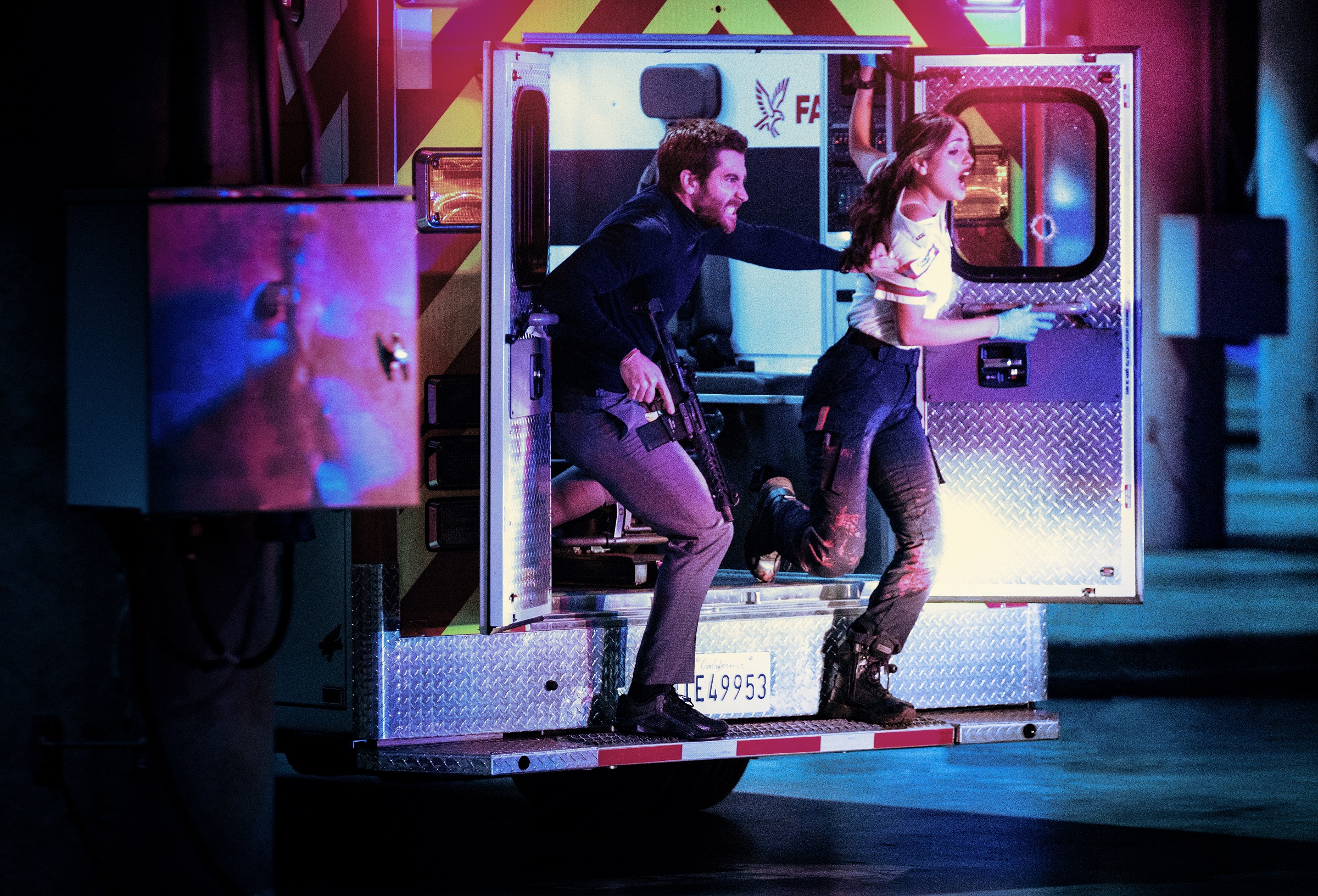
Jake Gyllenhaal as Danny Sharp and Eiza González as EMT Cam Thompson. Image: courtesy of Universal Pictures.
There’s barely ever a break in the intensity of the action, and music adds to the heightening of stress with the illusion of constant progression. The audience is left sitting on their hands just to stop themselves from nail-biting, so when Gyllenhaal cracks a joke and momentarily breaks the tensions, it is such a welcome relief that it elicits a bigger laugh than it deserves.
Of all Bay’s stress-inducing cinematic techniques, none is more nerve-racking and irritating than his queasy cinematography. There are intricate drone manoeuvres, trolley pulls, sweeping pans, extreme close-ups and excessively convulsing handheld shots, all intended to create a sense of drama and urgency. Instead these techniques make the viewer feel like they’ve been thrust into a blender full of guns, cars and angry white men. One imagines Bay shouting at cameramen with state-of-the-art equipment: “If what’s happening in-frame is not exciting enough, just shake the camera around!”
It’s not the genre that’s the problem – there are plenty of directors capable of creating meaningful and entertaining action films without all these bells and whistles. Nor is it a lack of action – Ambulance features real helicopter stunts, dozens of car crashes and a gory scene in which an armed robber performs surgery on a cop during a high-speed car chase. It’s just poor camerawork and editing.
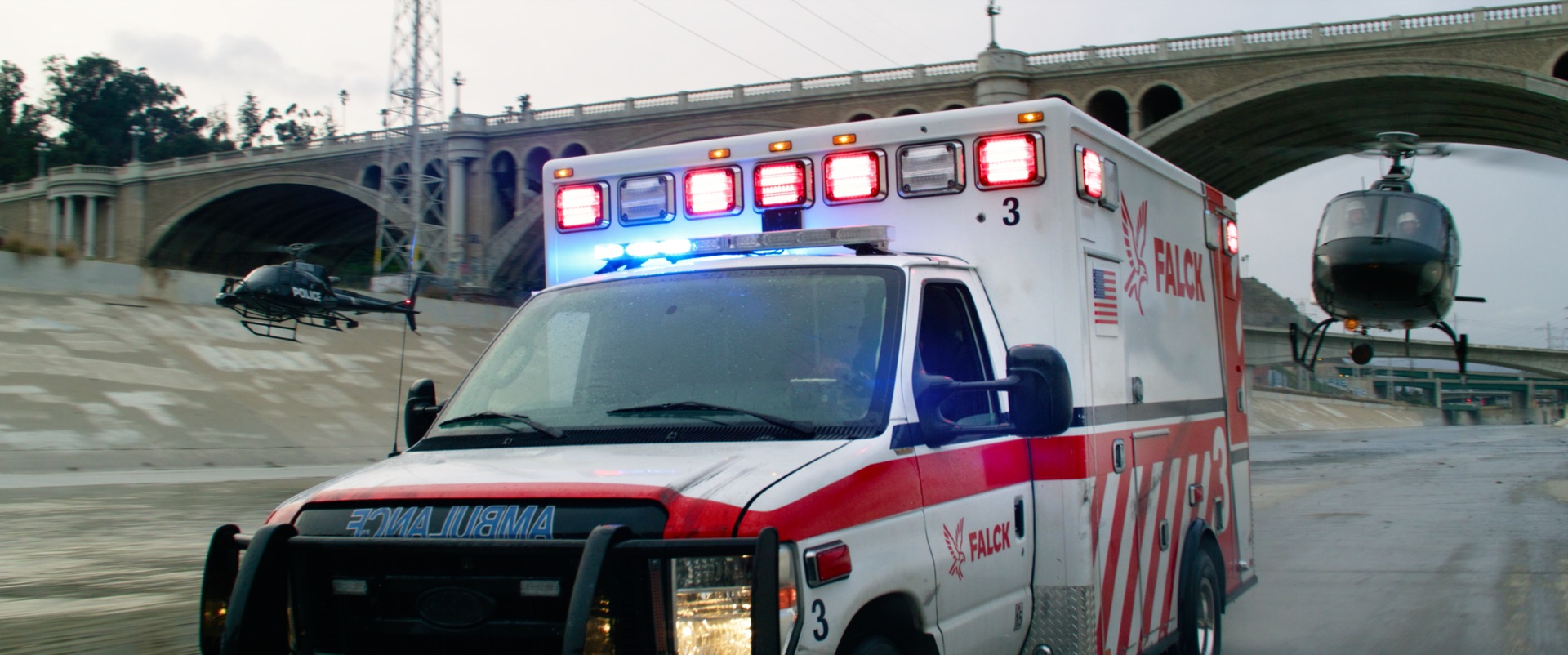
Helicopter stunts without CGI in ‘Ambulance’. Image: courtesy of Universal Pictures.
The car chases are cut and spliced together to such an extent that there is no continuity – it’s unclear what is causing what – it’s just dislocated, fast-cut chunks of chaotic gunfire and people getting hurt.
The sound editing is no better. Bay’s films are extremely loud yet the dialogue is often close to indecipherable. This may be due to bad improvisation, which in action films often manifests as characters shouting over one another inaudibly, but is left in because it’s generally accepted that the dialogue is not what’s important. Bay’s sentiment is that if you want clever words, you should read a book or something.
Even Bay himself knows that his movies are not intellectually sophisticated. He famously once derided his critics, saying: “I make movies for teenage boys. Oh dear, what a crime!” So why bother critiquing his films if everyone already knows they’re so shallow? What makes many of us drawn to the kind of mindless action that Bay offers? Whether it’s due to an innate male fascination with power and conflict, an outlet for pent violent impulses, or just herd mentality, the popularity of Bay’s films – vehicles of mindless destruction – is congruent with a cynical impression of humanity as insubstantial animals of barbarism.
If we wish to give credit only where credit is due, then it’s important to remind people that popularity is not synonymous with merit. Just because millions will watch Ambulance, does not mean it’s worth watching. And every person dazzled and tricked by its marketing into watching it (and inevitably leaving disappointed) is another dollar in Bay’s pocket and another reason a better film might not get made in the future. DM/ ML
Ambulance is available in South Africa in cinemas from 25 March.
You can contact This Weekend We’re Watching via [email protected]

















 Become an Insider
Become an Insider
Comments - Please login in order to comment.